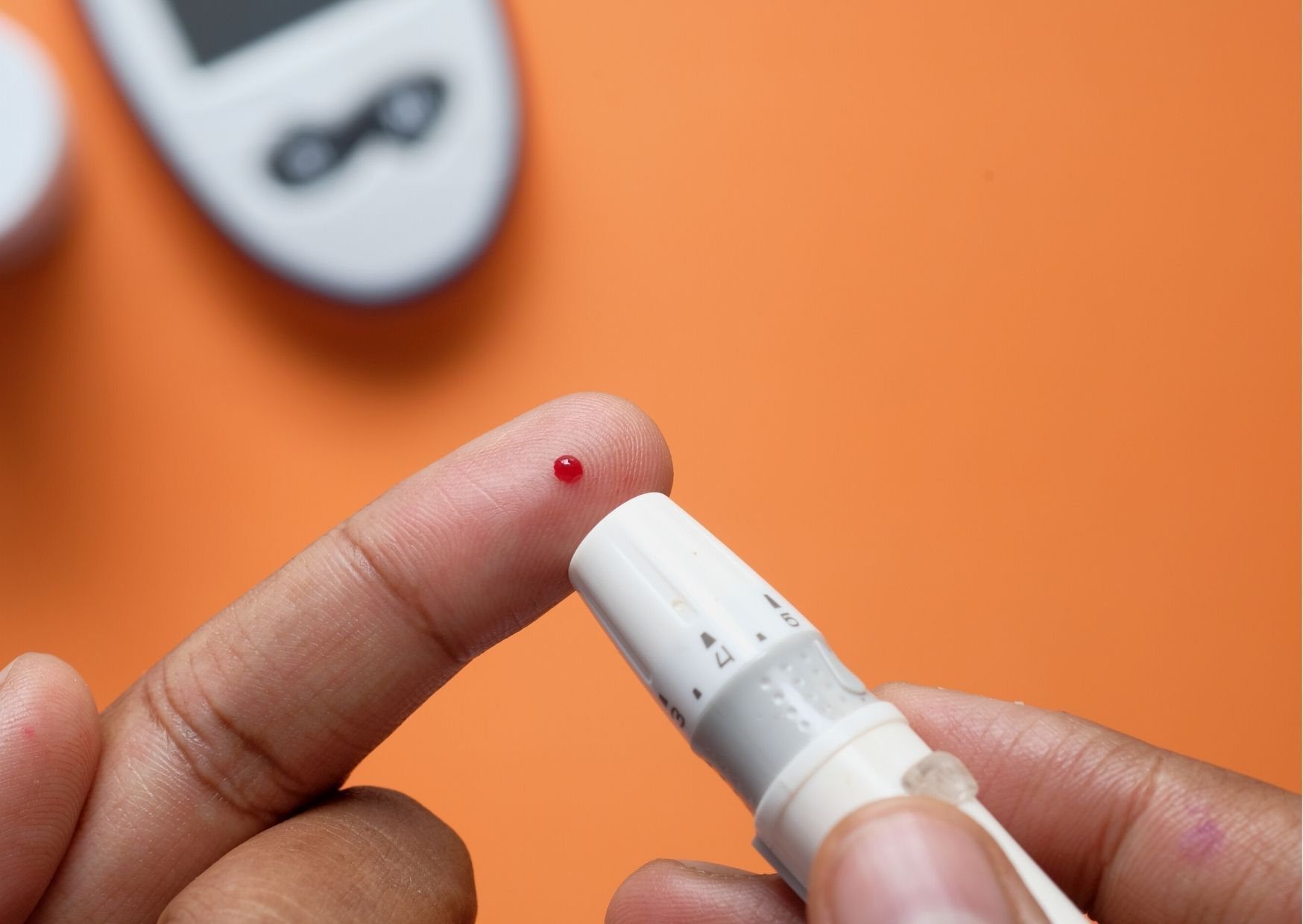Understanding Diabetes | Types, Risk Factors, Treatment & More

Diabetes mellitus is a chronic condition that affects how your body turns food into energy. The food you eat gets broken down into sugar, also called glucose, which is your cells’ primary energy source. Insulin, a hormone secreted by the pancreas, allows the cells in your muscles to absorb glucose from the blood so that they can function properly.
When your pancreas doesn’t secrete enough insulin or your cells stop responding to insulin, there is an increase in sugar levels in both the urine and blood, resulting in diabetes. If left untreated, this can lead to various health complications, including kidney damage, heart disease, glaucoma, and even nerve damage.
According to the National Diabetes Statistics Report, 34.2 million Americans have diabetes. Though diabetes can often feel like an obstacle to living your best life, it doesn’t have to be. An in-depth understanding of the chronic disease, diabetes self-management education, and support, healthy eating, exercise, medication, and regular health care appointments can help you get back to being you, and doing the things you enjoy.
Common Types of Diabetes
Type 1 Diabetes
5.2% of all American adults have type 1 diabetes. It is caused by an autoimmune reaction where the body attacks itself by mistake, destroying the insulin-producing cells in your pancreas. Though it usually affects children and young adults, it can develop at any age. People with type 1 diabetes have to replace the missing insulin with injections and insulin pumps.
Type 2 Diabetes
About 90–95% of diabetic patients have type 2, making it the most common type of diabetes. Here, your body develops insulin resistance and struggles to keep your blood sugar levels at normal. The symptoms develop over a long period and can be hard to spot. Age, genetics, and various other factors can increase your chance of developing type 2 diabetes. So, if you’re at risk, it is wise to get your blood sugar tested regularly. Healthy eating, exercise, losing weight, and positive lifestyle modifications allow you to stay ahead of type 2 diabetes.
Gestational Diabetes
This type of diabetes develops during pregnancy in people who have never had diabetes before. During pregnancy, the hormones produced by the placenta reduce your cells’ ability to use insulin effectively. Though this type of diabetes goes away post-pregnancy, it increases your risk for type 2 diabetes later in life.
Prediabetes
This condition is a precursor to type 2 diabetes, where your blood glucose levels are higher than normal but not high enough to be officially diagnosed with diabetes. You can have prediabetes for years without any clear symptoms. In fact, 84% of people with prediabetes don’t know they have it. So, you need to consult your doctor and get your blood sugar levels tested regularly if you are at risk for type 2 diabetes. When you’re diagnosed at the prediabetes stage, you can take the necessary precautions to avoid diabetes.
Symptoms of Diabetes
The early symptoms and warning signs of diabetes can be easily missed. This is especially true for prediabetes and type 2 diabetes, where patients often go undiagnosed for a long time. On the other hand, with type 1 diabetes, the symptoms tend to appear more quickly and are more severe.
Increased Thirst and Frequent Urination
The average human being urinates between four and ten times in 24 hours. But, if you have diabetes, you might find yourself peeing more often. This is because your kidney cannot reabsorb the excess glucose in your blood, resulting in your body making more urine. The dehydration caused by frequent urination makes you thirstier, and drinking more water makes you urinate more frequently.
Extreme Hunger and Fatigue
As a metabolic condition, diabetes makes it harder for your cells to take in the glucose they need for energy. As a result, you start feeling more hungry and tired. Irritability and unexplained weight loss are also signs of diabetes.
Dry Mouth and Itchy Skin
Frequent urination and the consequent dehydration lead to dry mouth and skin.
Blurred Vision
High blood sugar can cause the lenses of our eyes to swell, making it harder to see clearly.
Yeast Infections
Yeast feeds on glucose. The increased blood sugar levels make it easy for both male and female diabetes patients to contract yeast infections.
Slow Healing Sores and Cuts
After some time, high blood glucose levels can affect blood flow and cause nerve damage. This also results in another important sign of diabetes—pain or numbness in your feet or legs.
Gestational Diabetes
This does not cause any noticeable symptoms. Generally, you will be tested for gestational diabetes between 24 and 28 weeks of pregnancy.
Diabetes Risk Factors
Type 1 Diabetes
Children and Young Adults with a Family History of type 1 diabetes are more susceptible. A severe viral illness at an early age can also make you vulnerable to type 1 diabetes. Though most diagnoses are in children, adults can also develop this metabolic disorder.
Type 2 Diabetes
● Obesity
● 45 Years of Age or Older
● Family History of Diabetes
● Prediabetes
● Physical Inactivity
● High Blood Pressure, Cholesterol, & Triglycerides
If one or more of the risk factors apply to adults between 19 and 44, they must get tested for type 2 diabetes. Children between the age of 10 and 18 who are overweight and have at least two of the risk factors must also get tested.
Gestational Diabetes
You are at an increased risk of gestational diabetes if you are:
● Overweight
● Over the Age of 25
● Have a Family History of Type 2 Diabetes
● Suffer from Polycystic Ovary Syndrome (PCOS)
● Had Gestational Diabetes during a Previous Pregnancy
● Gave Birth to a Baby Weighing More than 9 Pounds
In most cases, you will be tested for gestational diabetes between weeks 24 and 28 of your pregnancy. If you have other risk factors, it is best to consult with your doctor and get tested earlier.
Treatment & Management
Diagnosis & Tests
Diabetes often goes unnoticed for long periods until they result in significant health complications. So, the first step to managing your diabetes is early diagnosis. If any of the risk factors apply to you, It is best to get your blood glucose levels checked periodically. Four tests can measure your blood glucose levels:
1) A1C Test
Also called the HbA1C or glycated hemoglobin test. The A1C test measures your average blood sugar levels over the past two or three months. If your A1C levels are:
● Below 5.7% – Normal
● Between 5.7% and 6.4% – Prediabetes
● 6.5% And Above – Diabetes
You don’t have to fast before this test.
2) Random Blood Sugar Test
This test can be done at any time, and you don’t need to fast beforehand. It measures your blood sugar at the time you’re being tested. If your blood sugar level is 200 mg/dL or higher, you have diabetes.
If your physician thinks you’re at risk of type 1 diabetes, they might also test your blood for autoantibodies and your urine for ketones. The presence of autoantibodies and ketones in your blood and urine is a strong indicator of type 1 diabetes.
3) Fasting Blood Sugar Test
This test is done in the morning after eight hours of not eating or drinking anything but water. A fasting blood sugar level of:
● 99 mg/dL or lower – Normal
● 100 mg/dL to 125 mg/dL – Prediabetes
● 126 mg/dL or higher – Diabetes
4) Oral Glucose Tolerance Test
First, your blood glucose level is tested after eight hours of overnight fasting. Then, you will drink a sugary liquid, following which your blood sugar is measured after one, two, and three hours. After the 2 hour mark, if your blood sugar level is at:
● 140 mg/dL or lower – Normal
● 140 mg/dL to 199 mg/dL – Prediabetes
● 200 mg/dL or higher – Diabetes
Diabetes Treatment Guide
A diabetes diagnosis can be scary and overwhelming. But, the good news is you don’t have to do it alone. With the help of trusted medical experts and loving friends and family, you can tackle your diabetes and get your life back on track. An experienced internal medicine physician can help you create possible diet plans, monitor potential complications, and prescribe oral medications, insulin, and other treatment options to manage diabetes.
Diabetes Self-Management
● Follow a healthy diet plan that is tailored to your needs. Meals high in nutrition and fiber and low in fats and calories are ideal for diabetes management. But worry not, eating healthy does not mean you can’t enjoy tasty food!
● Exercise regularly. Work with your healthcare team to create a weight loss program.
● Monitor your blood sugar levels at home.
● Don’t skip prescribed medications or miss out on a doctor’s appointment.
● Quit smoking.
At Rocky Vista Health Center, we believe in holistic diabetic care and treatment, and that’s why our internal medicine physicians will work with you to find the best course of treatment possible. We offer a variety of services to ensure the health and well-being of Parker, CO residents, so get in touch or schedule an appointment today!
Keep Your Friend's Informed






